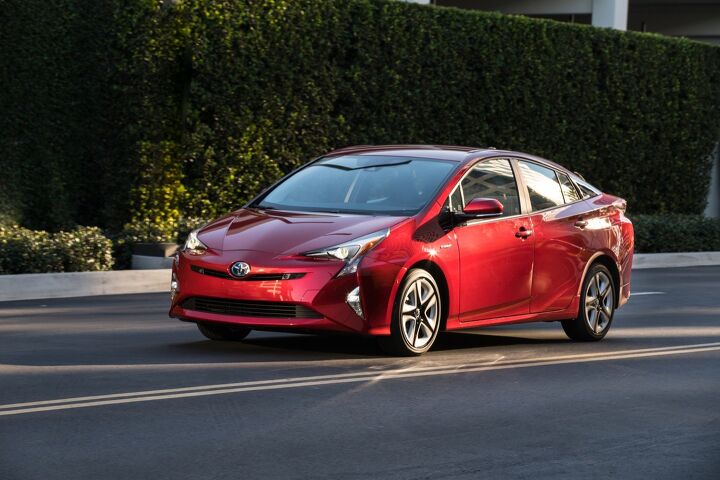A U.S.-launched Trade Dispute Is Helping Toyota in One Key Market, but for How Long?

While the trade situation is still very much in flux, Toyota sees itself as standing to gain from the turmoil, just not in the United States. The automaker, along with other Japanese brands, finds itself in an advantageous position in China — a massive market facing its own troubles.
China’s anger at the U.S., and vice versa, could mean big bucks in the short term for Toyota.
According to the Financial Times, Toyota sees China as a big opportunity, and wants to capitalize on the current trade situation. In early summer, in response to tariffs levelled by the U.S., China slapped new tariffs on top of the ones it already applied to imported American cars. At the same time, it lowered tariffs on vehicles brought in from other countries, including Japan.
Toyota performs much of its manufacturing in Japan, and all of the Lexus-branded vehicle it sells in China arise from its home country. As the tariffs translated into higher prices for many U.S. luxury cars sold in that market, Lexus sales skyrocketed in August. The brand’s Chinese sales rose 59 percent, year over year, last month, setting a new monthly record.
Despite a three-month downturn in Chinese auto sales sparked by the trade tiff, Toyota recorded a 23 percent year-over-year sales increase in August. Compare that to Ford Motor Company’s 36-percent drop.
“It’s inevitable for Toyota to shift to China with a sharp slowdown in the US,” Masahiro Akita, analyst at Credit Suisse, told FT. “It’s also perfect for Toyota since it will help them to maintain their commitment to producing 3m vehicles in Japan.”
Last month, Reuters reported that Toyota planned to boost its Chinese automotive production by 20 percent, or another 240,000 vehicles per year. The automaker has assembly plants in Tianjin and Guangzhou, building 1.16 million vehicles per year. Increased state subsidies for electric vehicles and the country’s promise to relax, then eliminate, rules on foreign ownership has Toyota seeing green.
While much of China’s energy goes into building (and talking up) electric vehicles, it remains interested in hybrid technology — something Toyota knows much about. Sources tell FT that the country wants the maker of the Prius to share its technological prowess in that field.
Of course, there’s many ways this situation can turn sour for Toyota. China’s economy could tank, leaving fewer buyers for Toyota’s vehicles, or the U.S. could levy new tariffs on Japan, throwing its North American operations into chaos. Over the first eight months of 2018, Toyota Motor Corp. sales in the U.S. rose 1 percent, to 1,621,137 vehicles.
[Image: Toyota]

More by Steph Willems
Latest Car Reviews
Read moreLatest Product Reviews
Read moreRecent Comments
- 3-On-The-Tree Lou_BCone of many cars I sold when I got commissioned into the army. 1964 Dodge D100 with slant six and 3 on the tree, 1973 Plymouth Duster with slant six, 1974 dodge dart custom with a 318. 1990 Bronco 5.0 which was our snowboard rig for Wa state and Whistler/Blackcomb BC. Now :my trail rigs are a 1985 Toyota FJ60 Land cruiser and 86 Suzuki Samurai.
- RHD They are going to crash and burn like Country Garden and Evergrande (the Chinese property behemoths) if they don't fix their problems post-haste.
- Golden2husky The biggest hurdle for us would be the lack of a good charging network for road tripping as we are at the point in our lives that we will be traveling quite a bit. I'd rather pay more for longer range so the cheaper models would probably not make the cut. Improve the charging infrastructure and I'm certainly going to give one a try. This is more important that a lowish entry price IMHO.
- Add Lightness I have nothing against paying more to get quality (think Toyota vs Chryco) but hate all the silly, non-mandated 'stuff' that automakers load onto cars based on what non-gearhead focus groups tell them they need to have in a car. I blame focus groups for automatic everything and double drivetrains (AWD) that really never gets used 98% of the time. The other 2% of the time, one goes looking for a place to need it to rationanalize the purchase.
- Ger65691276 I would never buy an electric car never in my lifetime I will gas is my way of going electric is not green email


































Comments
Join the conversation
What I got from this article is that China has Import Taxes, Vats, Displacement Taxes and a Final Sales Tax on imported products. China does this to incentivize manufacturers to produce their products domestically and provides refunds/incentives to export does products from their Chinese factories. And now they have raised does Taxes on imported American Luxury vehicles, and other goods after the USA raised reciprocal VAT's on Chinese made cars, steel, aluminum and other manufactured goods. This simply looks like China wants to keep the status quo, have Foreign markets open to Chinese made goods while keeping their domestic markets closed and and controlled.
STOP THE PRESSES! Toyota has a good month in China. Bravo when TTAC sends a report card home, to be signed by Toyota's parents, there should be a gold star in the China sales row. In other news the Cleavland Browns won their first game in 2 years. Lets talk Superbowl.